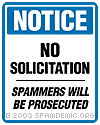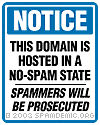![]()
![]()
![]()
![]()
![]()

![]()
![]()
![]()
![]()
Secretary of State Websites
Internic Whois
Network Solutions WhoIs
ARIN IP Lookup
![]()
(California Lawyer, June 2011)
Making Spammers Pay
(CNN, 1/8/2011)
Man Quits Job, Makes Living Suing Email Spammers
(Yahoo/AP, 12/26/2010)
You Don't Wanna Mess With Dan, Who Hates Spam
(Legal Pad, 6/8/2010)
(SF Weekly, 3/17/10)
SF Lawyer Awarded $7K From Email Spammer
(SFGate, 3/16/10)
Bill Toughening Anti-Spam Law in Works
(SFGate, 4/18/08)
Fighting Back Against Spam
(ABC7 News
L.A.,
7/29/03)
(Time,
6/16/03)
![]()
 The endless pitches to
refinance my mortgage (which I don’t have) or get university degrees (of
which I already have three) or buy counterfeit software or enlarge certain
body parts… not to mention the porn… are offensive and, in many states, like
California, illegal.
The endless pitches to
refinance my mortgage (which I don’t have) or get university degrees (of
which I already have three) or buy counterfeit software or enlarge certain
body parts… not to mention the porn… are offensive and, in many states, like
California, illegal.
Why does spam exist?
It sure wasn’t the intent of the people who designed the Internet and email. With origins in academia and defense,
the Internet was set up so that there is no variable (i.e., per email) cost
to the sender to send a message.
The unfortunate result is that spammers, the scum of the Internet, can blast
millions of untargeted, offensive emails for their own financial gain, and you, the recipient, end up paying for the
spam.
And by the way,
spam now comprises 90+% of all email.
Smarter people than I have created some decent technological solutions
to the spam problem – click the "Why Spam Sucks" button for more on this.
I choose to attack the problem from the legal side. Why?
Because judgments (or pre-trial settlements) hit spammers, or the
marketers who choose to use spammers, directly in their pocketbooks.
My objective in getting into this was – and still is – to increase the
spammers’ cost of doing business.
Maybe then the spammers won't falsify headers, and maybe they’ll think twice
before spamming even after a recipient unsubscribes, and maybe the
legitimate and “quasi-legitimate” marketers will think twice before
purchasing lists of allegedly opt-in email addresses.
If lots of people start suing the spammers, and the principals that benefit
from spamming, maybe it’ll make a difference.
Photo by Gary Laufman
|
Comment to a
CBS Consumer Watch segment about me:
Dan hates
SPAM. |
You can forward spam to the Federal Trade Commission at
spam@uce.gov to help them build their
database of bad actors. If you have an idea who the spammer (or
spamvertiser) is, you can really have fun by filling out a complaint form at
https://www.ftccomplaintassistant.gov/FTC_Wizard.aspx?Lang=en.
This information (minus your specific identity) becomes public record
that anyone can access who sends a "Freedom
of Information Act Request" to the FTC.
| I don't like telemarketers either. Click here to register your home/cell phone with the FTC’s “Do Not Call” list, or to file a complaint. Telemarketers who call you if you’re on the list may be fined up to $11,000. |
 |
Along these lines, here's a website
with some information on how to sue telemarketers: |
|
Legitimate contacts only: |
| I also hate forced arbitration clauses in contracts of adhesion that deny consumers the right to fight back. Let's say you sign up for cell phone service. Buried in those pages and pages of tiny print you'll usually find a class action waiver, and a provision that forces you into arbitration for any kind of dispute. It's not like you had any power to negotiate that contract. And it's not like you can go to some other cell phone provider, because they all have comparable language. So if AT&T overcharges you five bucks, you have to shell out hundreds or thousands of dollars in arbitration costs to fight it, which you won't do, and AT&T knows it. So they can get away with overcharging you. This is exactly why class actions exist... so lots of people, each harmed just a little bit, can join together. Which is why the California Supreme Court and the Ninth Circuit said that class action waivers like these are unconscionable and void. But the U.S. Supreme Court says it's too risky to defendants if class action waivers are void. Seems to me what's really risky to defendants is doing bad things that make people want to sue you! Anyway, there's proposed legislation in the works to fix this. Click here to sign Citizen.org's petition to end forced arbitration. |
NO SPAM POLICY!!!!
All persons, businesses, and other entities that send any unsolicited
commercial email to any email address containing “danbalsam.com”
voluntarily enter a contract with Dan Balsam and agree to be bound by
the terms of the contract and “No Spam Policy” as described herein.
 1.
Unless Dan Balsam or someone else with an email address including
“danbalsam.com” has specifically opted in to receive commercial email
from you, you understand and agree that neither Dan Balsam nor anyone
else with an email address including “danbalsam.com” has ever requested
any commercial communication from you, and that any commercial email you
send that includes “danbalsam.com” in the To, Cc, or Bcc fields that
fits these criteria is against the express wishes of the recipient(s).
1.
Unless Dan Balsam or someone else with an email address including
“danbalsam.com” has specifically opted in to receive commercial email
from you, you understand and agree that neither Dan Balsam nor anyone
else with an email address including “danbalsam.com” has ever requested
any commercial communication from you, and that any commercial email you
send that includes “danbalsam.com” in the To, Cc, or Bcc fields that
fits these criteria is against the express wishes of the recipient(s).
